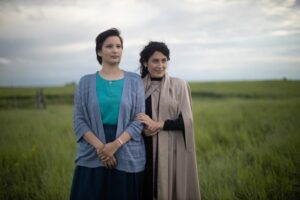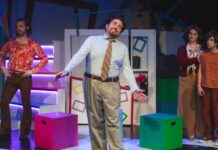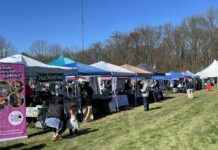
By Shira Li Bartov
When Jennifer Podemski’s Indigenous mother gave birth at 17, social workers removed Podemski from a Toronto hospital and put her into the foster care system. It was only through the efforts of one social worker, who was retiring, that she was reunited with her mother at 3 months old.
The social worker had saved Podemski from the infamous “Sixties Scoop,” a policy in Canada between the 1960s and 1980s that tore thousands of Indigenous children from their families and put them into the child welfare system.
Growing up in a Jewish area of Toronto, Podemski learned more about her Israeli father’s side of the family because of the Jewish stories she was surrounded by — including some imparted from her paternal grandfather, a Holocaust survivor.
Now a filmmaker, Podemski has drawn heavily on her experience in co-creating “Little Bird,” a six-part series about the Sixties Scoop that debuted in Canada earlier this year and came to the United States on Oct. 12. Weekly episodes air on PBS through Nov. 16 and are available to stream on all PBS platforms, including PBS Masterpiece Prime Video.
“I wanted to humanize these experiences,” said Podemski, who is Indigenous to Saskatchewan on her mother’s side. “They haven’t yet been humanized because they haven’t been told.”
The show starts with Esther Rosenblum (played by Darla Contois) at her engagement party in 1985, enjoying almost-clichéd Jewish success — law school, a doctor fiancé named David and a large home shared with her tough-love adoptive mother. The mother, Polish-born Golda Rosenblum (Lisa Edelstein), survived the Holocaust and came to Canada as a teenager, having lost her entire family in Auschwitz.
Although Esther’s life looks pleasant, she tiptoes around a constant simmer of discrimination. She is shattered to overhear David’s mother fretting about him marrying “one of them,” referring to an Indigenous person adopted into a Jewish family. The future mother-in-law questions how their family is supposed to believe that Esther is a “regular Jew” who can become “a mother of her own — and that’s just going to go fine?” Another guest points out that David got “one of the good ones,” adding: “I have a cousin who adopted one of them and he’s into the drugs and all that stuff.”
A parallel storyline unfolds in 1968, when Esther was 5 and her name was Bezhig Little Bird. Bezhig was abducted along with her brother and sister by child welfare agents and police, who handcuffed their hysterical mother and beat their father, when he protested, to the brink of death. The series follows Esther/Bezhig on the journey to find her birth family and understand the roots she was torn from.
Like Esther, Podemski was raised in a Jewish community with a tenuous connection to her Indigenous ancestry. Her maternal grandparents were victims of the residential school system in Canada, which forcibly separated children from their families for long periods between the 1880s and the 1990s. The schools stripped children of their culture and native language, with the nominal objective of giving them a Euro-Canadian Christian education. The schools became notorious for physical, sexual and psychological abuse and high death rates.
Podemski had to seek out information on Indigenous history as a teenager when she began studying the atrocities committed against her people. She chafed at discriminatory remarks within her childhood Jewish community, even when they were unintentional, and struggled to feel at home.
“I grew up in a Jewish reality, one that I didn’t really fit into, the way I look,” Podemski said. “I never felt really like I belonged in either [Jewish or Indigenous] places.”
Podemski’s 30-year career has spanned both acting and producing, with a break-out role in Bruce McDonald’s 1994 film “Dance Me Outside” and award-winning credits for the 2003-2006 series “Moccasin Flats” and the 2013 film “Empire of Dirt.” Frustrated with the representation of Indigenous people in film and TV, she founded Big Soul Productions and Redcloud Studios Inc. to amplify Indigenous perspectives. Between 2021 and 2023, she appeared opposite her sisters Tamara and Sarah Podemski in the acclaimed FX series “Reservation Dogs.”
“Little Bird” places a premium on representation, with Indigenous Canadian actors playing the Little Bird family and Edelstein, who starred in the popular medical drama “House,” as Esther’s Jewish mother. The creators consulted advisers from Raven Sinclair, a Sixties Scoop survivor and University of Regina professor, to rabbis who approved scenes of Jewish ceremonies.
Edelstein said that she reached into her family memories to play Golda Rosenblum, conjuring images of her Jewish grandparents who immigrated from Eastern Europe.
“I was really excited to get to play a Jewish woman and to represent that story with dignity,” said Edelstein. “She reminded me a lot of my grandparents, so I definitely was remembering the gestures and feelings that I got from them.”
At the time of Esther’s fictional adoption, middle-class parents were typically advised to erase the past of their adopted Indigenous children, who were presented as mistreated or abandoned. Golda is at first defensive of her decision to help obscure Esther’s origins, but her love for her daughter eventually makes her a hero of the story.
“When I first met you, you were all dressed up in a nice dress but you didn’t smile,” she tells Esther in the series. “I thought, she has lost everyone, I have lost everyone, this is a good match. But it wasn’t true — you had a family.”
Co-creator Hannah Moskovitch said she felt a heavy sense of responsibility, as a Jew, approaching a story about the near annihilation of a culture. Although the histories are entirely different, some elements of state-executed plans to destroy the Indigenous people in North America and the Jews in Europe looked similar to her — from the meticulous bureaucracy and dutifully law-abiding foot soldiers to the dehumanizing language of “solutions” to Indigenous “problems.”
Yet despite those parallels, Moskovitch had never heard of the Sixties Scoop before starting work on the series.
“It’s shameful that I didn’t know,” she said. “I grew up with the injunction from my community, ‘Never forget.’ And then there was a genocide that had happened in my country that I didn’t know about.”







